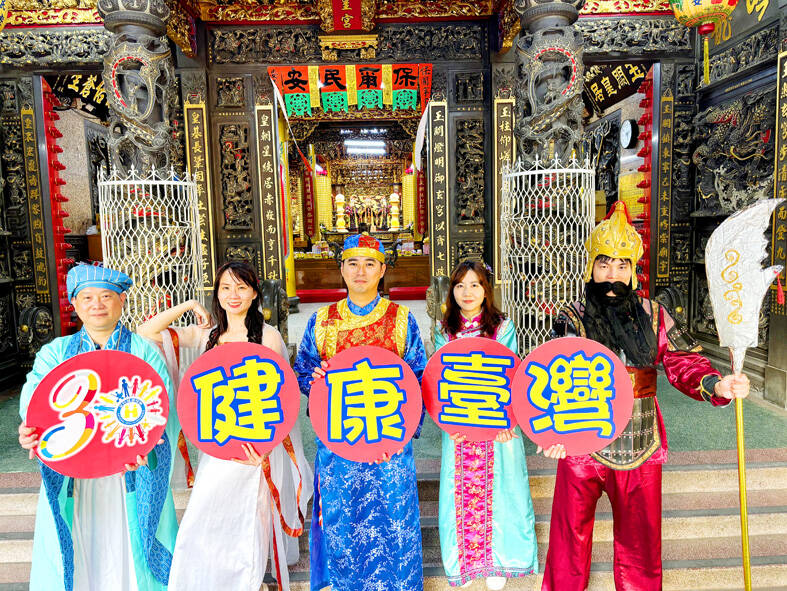The Executive Yuan yesterday unveiled a NT$48.9 billion (US$1.48 billion) policy to subsidize healthcare providers and medical research over the next five years, with the goal of making Taiwan the “most medically advanced nation” in the Asia-Pacific region.
Cabinet spokesperson Michelle Lee (李慧芝) made the announcement at a news conference following a Cabinet meeting in Taipei to finalize President William Lai’s (賴清德) Healthy Taiwan Cultivation Plan.
Citing Minister of Health and Welfare Chiu Tai-yuan’s (邱泰源) brief, Lee said the bill aims to improve working conditions, diversify the types of medical specialists Taiwan could train, introduce smart technology, and bolster the sector’s social responsibility and sustainability.

Photo: Wang Mei-hsiu, Taipei Times
Clinics and hospitals, community-based healthcare groups, medical associations and research institutions would be eligible for funding through the policy, depending on merit, she said, adding that they would apply only to entities that do not receive any other type of public funding.
The policy would target working conditions and professional ethics in the medical field, optimizing efficiency in hospitals, reforms in continuing education and career opportunities, and bolstering the number of critical care doctors and nurses, she said.
It would encourage hospitals to embrace artificial intelligence in therapeutics, administrative tasks, data sharing and cybersecurity, she said.
The implementation of the nation’s multi-tier healthcare system would be strengthened to secure its fiscal viability, she said.
The government would leverage the subsidies to improve medical care accessibility and equity, and foster the industry’s compliance with UN environmental, social and governance goals, she said.
Premier Cho Jung-tai (卓榮泰) was cited as saying at the meeting that the policy must avoid only rewarding big-name hospitals, and that benefits should be spread over the greatest number of healthcare workers.
The objective of the policy is to help the local healthcare system overcome its current limitations. develop resilience and inclusiveness, and be the best public health model in the Asia-Pacific region, he said.

Chinese Nationalist Party (KMT) Chairman Eric Chu (朱立倫), spokeswoman Yang Chih-yu (楊智伃) and Legislator Hsieh Lung-chieh (謝龍介) would be summoned by police for questioning for leading an illegal assembly on Thursday evening last week, Minister of the Interior Liu Shyh-fang (劉世芳) said today. The three KMT officials led an assembly outside the Taipei City Prosecutors’ Office, a restricted area where public assembly is not allowed, protesting the questioning of several KMT staff and searches of KMT headquarters and offices in a recall petition forgery case. Chu, Yang and Hsieh are all suspected of contravening the Assembly and Parade Act (集會遊行法) by holding

PRAISE: Japanese visitor Takashi Kubota said the Taiwanese temple architecture images showcased in the AI Art Gallery were the most impressive displays he saw Taiwan does not have an official pavilion at the World Expo in Osaka, Japan, because of its diplomatic predicament, but the government-backed Tech World pavilion is drawing interest with its unique recreations of works by Taiwanese artists. The pavilion features an artificial intelligence (AI)-based art gallery showcasing works of famous Taiwanese artists from the Japanese colonial period using innovative technologies. Among its main simulated displays are Eastern gouache paintings by Chen Chin (陳進), Lin Yu-shan (林玉山) and Kuo Hsueh-hu (郭雪湖), who were the three young Taiwanese painters selected for the East Asian Painting exhibition in 1927. Gouache is a water-based

Taiwan would welcome the return of Honduras as a diplomatic ally if its next president decides to make such a move, Minister of Foreign Affairs Lin Chia-lung (林佳龍) said yesterday. “Of course, we would welcome Honduras if they want to restore diplomatic ties with Taiwan after their elections,” Lin said at a meeting of the legislature’s Foreign Affairs and National Defense Committee, when asked to comment on statements made by two of the three Honduran presidential candidates during the presidential campaign in the Central American country. Taiwan is paying close attention to the region as a whole in the wake of a

OFF-TARGET: More than 30,000 participants were expected to take part in the Games next month, but only 6,550 foreign and 19,400 Taiwanese athletes have registered Taipei city councilors yesterday blasted the organizers of next month’s World Masters Games over sudden timetable and venue changes, which they said have caused thousands of participants to back out of the international sporting event, among other organizational issues. They also cited visa delays and political interference by China as reasons many foreign athletes are requesting refunds for the event, to be held from May 17 to 30. Jointly organized by the Taipei and New Taipei City governments, the games have been rocked by numerous controversies since preparations began in 2020. Taipei City Councilor Lin Yen-feng (林延鳳) said yesterday that new measures by